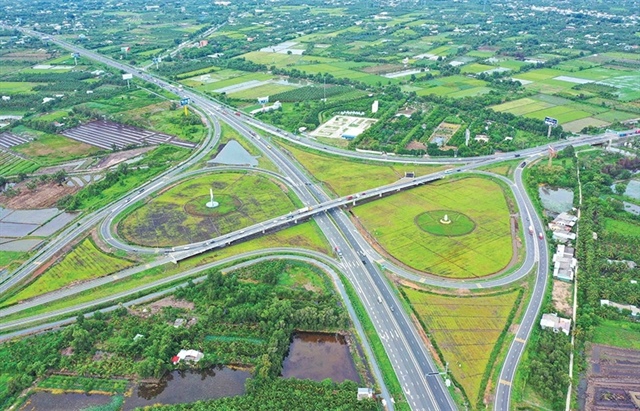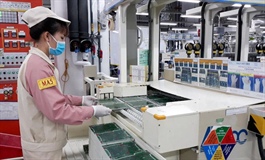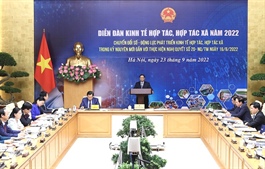Foreign investment disbursement hits record high in nine months
Foreign investment disbursement hits record high in nine months
Disbursement of foreign direct investment (FDI) in the first nine months of this year reached US$15.4 billion, up 16.2 per cent year-on-year and marking a record high, a report from the Foreign Investment Department (FIA) has shown.

This positive figures showed that foreign-invested enterprises have been constantly recovering and expanding their production and business activities in Viet Nam, FIA said in its report.
However, foreign investment inflows into Viet Nam saw a yearly decline of 15.3 per cent to over $18.7 billion in the nine-month period.
Up to 1,355 new foreign-invested projects were licensed during the period with a total registered capital of $7.12 billion, up 11.8 per cent in the number of projects but down 43 per cent in terms of the level of capital.
The agency attributed the decline in newly-registered capital to difficulties encountered by foreign investors in coming to Viet Nam to explore investment opportunities and fulfilling investment registration procedures in the last months of 2021 due to the State policies on controlling the COVID-19 pandemic. That have affected the number of new projects granted licences in the first months of 2022.
Also, the global market has been facing many fluctuations due to the influence of the geopolitical conflict in Europe, high inflation pressure, and supply chain disruptions, which have been negatively affecting the outflow of foreign investment from major economies, especially investment partners of Viet Nam.
The FIA also named a lack of large-scale projects worth over $100 million in the first months of 2022 compared to that of 2021 as one of the major reasons. These projects including Long An 1 and 2 LNG power plants worth a combined over $3.2 billion and O Mon 2 thermal power plant valued at above $1.3 billion contributed 62.3 per cent of the total capital pledged in the nine months of 2021.
Meanwhile, the first nine months of this year saw few foreign-invested projects with a scale of over $100 million, and these projects accounted for only 37.2 per cent of the period's total registered investment capital.
In another bright spot, capital added by foreign businesses to 769 operating projects in the country surged 30 per cent to $8.3 billion. That has demonstrated their great confidence in Viet Nam's economy and its investment climate, according to the agency.
Phan Huu Thang, director of the Foreign Investment Research Centre, agreed. He told baodautu.vn that the success of the large-scale foreign enterprises in Viet Nam would help attract other ones to the country.
At the same time, foreign investor capital contributions and share purchases also recorded a yearly hike of 2 per cent to $3.28 billion.
The processing and manufacturing sector lured the lion's share of FDI with over $12.1 billion, accounting for 65 per cent of the country's total capital.
Real estate came next with $3.5 billion or 18.7 per cent. Science and technology and wholesale and retail were the runners-up with $677 million and $620 million, respectively.
Singapore remained Viet Nam's leading source of foreign investment with above $4.75 billion, making up 25.3 per cent of the total FDI registered in the country.
South Korea followed with nearly $3.8 billion or 20.3 per cent, and Japan with $1.9 billion or 10.2 per cent.
The country's other major foreign investors were mainland China, Denmark and Hong Kong.
A survey conducted by the Ministry of Planning and Investment and the Vietnam Business Forum Alliance (VBF) in September 2022 showed that over 90 per cent of FDI enterprises achieved medium and high business efficiency and financial status.
Most surveyed businesses expressed their optimism and confidence in Viet Nam and committed to continue to expand investment in the country. Of them, 66 per cent said they planned to enlarge their investment scale in 2023.
According to the FIA director Do Nhat Hoang, Viet Nam expected good results in FDI attraction in 2022 and following years when countries have been gradually opening up their economies and adapting to the new normal conditions.
In addition, many international corporations and businesses have been looking for investment locations to diversify their supply chains and Viet Nam has been evaluated by international organisations as an attractive and safe investment destination.
In the next two or three years, technology corporations still prioritise Viet Nam as an investment or expansion location, especially in manufacturing and processing, technology pharmaceuticals and energy, Hoang told baodautu.vn.
In order to effectively catch up with this investment wave, Minister of Planning and Investment Nguyen Chi Dung emphasised the importance of preparing an adequate source of land, perfecting infrastructure and bettering the supply of energy and skilled labour.
Improving capacities of domestic enterprises so that they could participate in value chains while drawing up incentives and investment support packages to negotiate with strategic foreign investors should also be included.
In the long term, it would also be necessary to improve the business investment environment and speed up administrative reform, Dung said.























